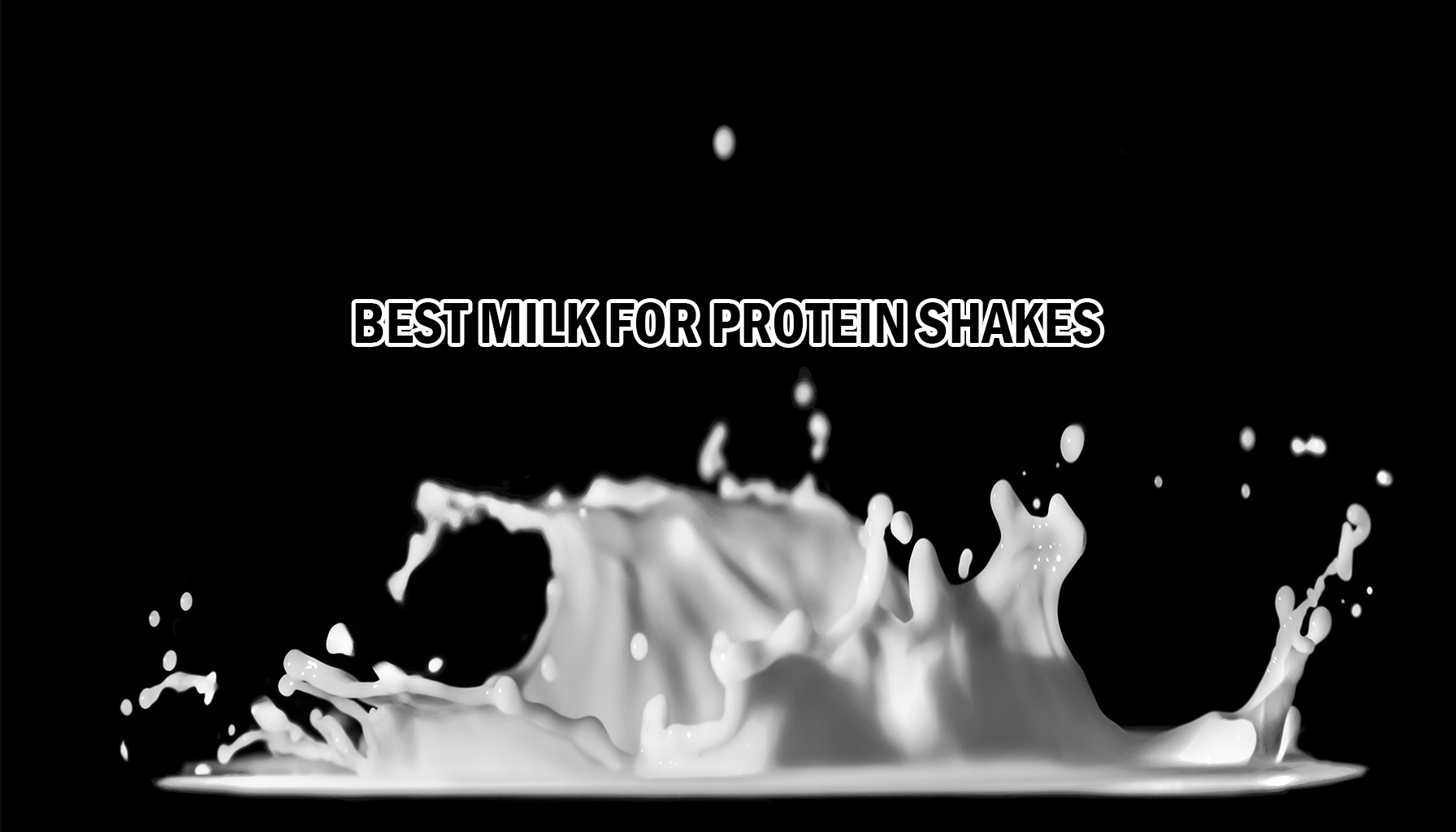We’re here to delve into the world of protein shakes and the quest to find the best milk to add to your protein shake. It’s not just about taste and texture, it’s also about nutritional values that align with your goals. The ideal milk for your protein shake should be low in saturated fat, packed with vitamins and minerals, and contain minimal added sugar.
But remember, what’s best for one might not be best for another. The nutritional value of your chosen milk can significantly impact the overall health benefits of your shake. For example, whole milk offers a high protein content and plenty of vitamins, but it’s also high in saturated fat and calories. On the flip side, almond milk is low in fat and calories, and typically fortified with vitamins and minerals.
So, let’s dig deeper and find out which milk is best for your protein shakes.
Milk Alternatives For Protein Shakes
Switching up the type of milk used in protein shakes can significantly alter the nutritional profile, taste, consistency and health benefits of the shake. Numerous milk alternatives are available, each with its unique pros and cons. Let’s delve into some of the most common options.
Almond Milk
Almond Milk has quickly risen to popularity as a low-fat and low-calorie option for protein shakes. With minimal monounsaturated fat and often packed with fortified vitamins and minerals, it’s a versatile choice. Remember that while it is a good source of nutrients, almond milk is relatively low in protein compared to other options. Almond milk will give your protein shake a light, nutty flavour and creamy texture. It’s a top pick for those following a low-calorie or low-fat diet.
Soy Milk
Originating in China, Soy Milk has been a dietary staple for centuries. In modern health circles, it’s favoured for its relatively high-protein content among dairy-free milks – around 7-20 grams per cup, depending on the brand. It’s also a great lactose-free alternative for those with dietary restrictions. Soy milk can provide a creamier consistency than almond milk, making for a hearty, protein-rich shake.
Oat Milk
Another rising star in the milk substitute scene, Oat Milk is made from a simple blend of oats and water. Natural and rich in fibre, it has a creamy texture and a neutral taste which makes it attractive to those wanting to keep the focus on the protein flavour. Oat milk is generally low in fat, though higher in carbohydrates than most other alternative milks. It’s also naturally lactose-free which is a boon for those with lactose intolerance.
Cashew Milk
Creamy and subtly sweet, Cashew Milk is a delightful addition to protein shakes. However, similar to almond milk, it’s low in protein, so ensure your protein powder can balance out the nutritional profile. Cashew milk is also packed with heart-healthy monounsaturated fats, making it a healthy milk alternative.
Other Milk Alternatives
Other alternative milks worth a mention include goat milk, pea milk, rice milk and others. Goat milk is rich in a variety of nutrients, while pea milk boasts a high protein content. Just like almond and cashew milk, rice milk is low in protein but high in carbohydrates.
Choosing a milk alternative should primarily be based on your personal taste preference, nutritional needs, and dietary restrictions. Remember, it’s about complementing the protein powder’s nutritional profile, achieving a desirable taste and consistency, and supporting your overall health goals.
How To Choose the Best Milk for Protein Shakes
We’re taking a deep dive into the factors to consider when choosing the best milk for protein shakes. It’s not just about the protein content, but several other factors contribute to making that perfect protein shake. Let’s explore further.
Nutritional Value
It’s important to consider the nutritional value of the milk you choose. For example, if you’re looking for a low-fat option, almond milk might be up your alley with its monounsaturated fats and low calorie content. It’s also fortified with essential vitamins and minerals. Heck if you’re looking for a super low calorie option, why not just add water instead of milk!?
On the other hand, whole milk is a high-protein, high-calorie option full of vitamins – ideal for those trying to increase their daily calorie intake in a bid to build muscle.
And if you’re after plant-based protein, soy milk boasts an impressive 8 grams of complete plant-based protein per serving, making it a formidable contender. It’s even recognised by the USDA as nutritionally equivalent to cow’s milk.
Pro tip: To boost the protein content of your shake, you might consider mixing it with semi-skimmed cow’s milk which can give you an extra 12-13 grams of protein per serving.
Calories
The calorie content is another key factor to consider. If weight loss is your primary goal, go for unsweetened almond milk. With the lowest calorie count, it aids those on a low-carb diet. The NIH has even indicated that almond milk, being rich in monounsaturated fatty acids (MUFAs), can help with weight loss and management by reducing overall calorie consumption.
Flavour
The flavour of the milk can greatly affect the taste of your protein shake. If you’re not keen on any additional flavour, water might be a good choice. On the flip side, if you prefer a creamier shake, soy milk or cashew milk could be your best bet. Remember, taste is significantly subjective. What tastes good to one person may not necessarily taste good to another.
We recommend giving them each a try, and sticking to the one that you most enjoy.
Cost
Cost plays a crucial role too. If you’re on a budget, you’d want to consider the cost per serving. Dairy free milk alternatives tend to be pricier than regular milk. For instance, almond milk and cashew milk are generally more expensive than cow’s milk, but they can offer some health advantages that might justify the extra cost.
Texture
The consistency of your protein shake can be affected by the type of milk you choose. Soy milk, known for its creamier consistency, can result in a smoother shake. Almond milk and cashew milk can yield a luscious, velvety consistency, which you might prefer.
Convenience
Let’s not forget about convenience. Some milk alternatives are readily available in the grocery store, while others might require a trip to a health food store or an online order. Cow’s milk is easily accessible, but if you’re opting for a less common milk alternative, make sure it’s readily available in your area or online.
Type Of Protein
Considering your protein powder of choice also will have an impact on what milk is best suited. Take Whey protein for example – it mixes perfectly with a variety of different milks such as cow, almond, cashew and soy.
On the other hand, if you’re using a whey protein alternative such as pea or hemp protein, it’s unlikely you’re going to mixing them with cows milk (1. Becuase they don’t taste great and 2. because you’re probably following a vegan diet anyway, hence the vegan protein powder!). You’re much better off mixing them with the dairy free alternatives we’ve listed throughout the article.
The Final Say
We’ve explored a range of milk alternatives for protein shakes, each with its own unique benefits. Almond milk’s low-fat content and essential nutrients make it a great choice for those watching their weight. Whole milk, with its high protein and calorie content, suits those looking to bulk up. And let’s not forget soy milk, a fantastic source of plant-based protein.
But it’s not just about protein content. We’ve considered the calorie count, flavour impact, cost, texture, and convenience of these options. The right milk for your protein shake isn’t a one-size-fits-all answer. It’s about finding the balance that works for your preferences and dietary needs. So, experiment with different options and find the one that fits your lifestyle and goals. After all, the best milk for your protein shake is the one that you enjoy drinking and supports your health and fitness journey.
Frequently Asked Questions
What type of milk is best for protein shakes?
Typically, semi-skimmed milk is the optimal choice for protein shakes due to its lower content of saturated fat in comparison to whole milk. Saturated fat, if consumed excessively, can lead to health implications. If you follow a vegan diet, soy is a great dairy-free alternative.
What is the best liquid to mix with protein powder?
Water, dairy milk, kefir, plant-based milk such as almond or oat milk, and natural fruit juice are all excellent options for mixing with protein powder, depending on your dietary needs and taste preference.
What is the best protein shake for weight loss?
The best protein shake for losing weight can vary depending on individual dietary needs. Options include Orgain Organic Protein Powder for vegans, Premier Protein 100% Whey for low-carb diets, NOW Sports Egg Protein Powder for a pure protein source, Optimum Nutrition Gold Standard 100% Whey for a gluten-free diet, and Naked Whey for minimal additives.
Which milk has the most protein?
Generally, cow’s milk and soy milk contain the most protein. However, your choice should also consider other nutritional aspects and personal dietary needs.
Is oat milk good in protein shakes?
While oat milk can certainly be used in protein shakes, it has a lower protein content compared to cow’s milk. This may make it less beneficial as a post-workout drink where a higher protein content is generally preferred. Having said that, if you’re getting enough protein through other food sources, it’s not essential to maximise the protein content in your shake.







